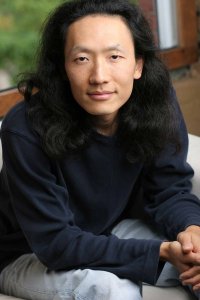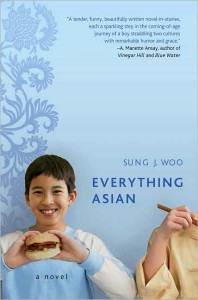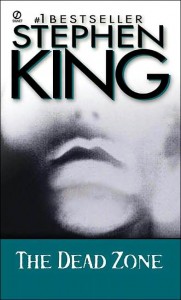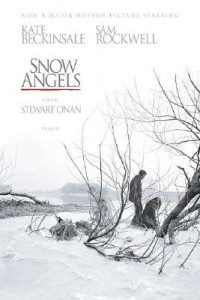
Sung Woo / photo by Sandra Nissen
Sung J. Woo was born in Korea and immigrated to the United States with his mother and two sisters in 1981; he was ten years old. Several years earlier, his father had moved to this country in order to establish a small business. That business would end up being a small, Asian-themed store in a mall in New Jersey, which in turn would one day serve as the basis for the setting of Sung Woo’s debut novel, Everything Asian.
Though modeled in part on the author’s own life, Everything Asian is more than just a coming-of-age tale or an immigrant narrative. It is also the portrait of a particular community and the odd intersections that take place between people who work in close proximity to one another but don’t always know each other very well. Captured with humor and generosity, the book chronicles one year in the lives of the Kim family as they adjust to a new life in the United States and interact with fellow shopkeepers at Peddlers Town.
In addition to Everything Asian, Sung J. Woo’s short stories and essays have appeared in such places as the New York Times, McSweeney’s, Carve, Pindeldyboz, Paradigm, Storyglossia, Miranda Magazine, and KoreAm Journal. A graduate of Cornell University with an MFA from New York University, he lives in Washington, New Jersey. He spoke with Jeremiah Chamberlin on May 15th during the Ann Arbor Book Festival.
Interview
 JEREMIAH CHAMBERLIN: Let’s begin with the genesis question. What was your path to writing? Were you someone for whom writing was always important, or did you come to it later in life?
JEREMIAH CHAMBERLIN: Let’s begin with the genesis question. What was your path to writing? Were you someone for whom writing was always important, or did you come to it later in life?
SUNG WOO: Yeah, much later. I wasn’t even much of a reader until 10th grade. My English class at that time did these visits to the library to pick out a book to read for pleasure. I had picked out Steven Crane’s The Red Badge of Courage. But this guy named Claude came over, he took one look at what I had, and he said, “Are you really going to read that?” I said, “No.” And he said, “I’ll get you something else.” So he went to one of those spinning racks that had the paperbacks—all the popular ones—and he brought back The Dead Zone. He took Stephen Crane away and he replaced it with Stephen King, and he said, “This is the book you should read.” So that’s how I started reading, with that book. And it’s the first time I ever realized that reading could be highly entertaining.
When you say “entertaining,” what do you mean by that?
 That I was so fully entranced with whatever world these people had created that I completely lost track of time. I wanted to do this instead of watch television, which was a total revelation to me.
That I was so fully entranced with whatever world these people had created that I completely lost track of time. I wanted to do this instead of watch television, which was a total revelation to me.
So when you did start writing, was it out of that want to be able to do for other people what you felt those authors had done for you?
Absolutely. I wanted to replicate that experience because it was so unique for me. And I wanted to do it just like they could. But it was hard! (Laughs.) In my mind it was so clear what I wanted to do, but then what actually came out was so vastly inferior.
It always feels like that, doesn’t it?
It’s true. But this was absolutely what I wanted to do. And since it didn’t even seem possible that I could write something long, I started writing short stories. I just started writing little short stories and I kept doing it.
Did you take writing classes in college?
I did. I took every single writing class I could possible take [at Cornell]. I took my first writing class with Stewart O’Nan.
He’s great. I once heard him say after a reading that when he was a young writer he used to tie his leg to his chair to keep himself at his desk. Did he ever tell you that?
That story! (Laughs.) Yes. He said that when he’s writing he has this urge to get up to look at his bookshelves, for some reason. Doesn’t really help him, but it’s just a habit. And I think having his ankle tied to the chair helped to break that habit.
So have you ever written in Korean, or do you do all your writing in English?
I do all my writing in English. I couldn’t even write in Korean. I can write basic sentences in Korean now, but so much of it I’ve lost. The only Korean that I’ve had to deal with was when I was in college—I did a translation of a children’s book to meet my language requirement. It was fun.
Speaking of kids, you’ve been pretty open about the fact that much of your book is based on your own childhood. So why did you choose to undertake this material as a novel, rather than writing a memoir about that experience?
Somebody else asked me this question, too, because I think I would have gotten paid more! (Laughs.) But the whole idea of writing about my life straightforward, like in a memoir, never really occurred to me, even though I have ended up writing essays that are very personal. Because I always think there’s a stigma of vanity in writing a memoir. Is my life that interesting enough to warrant me writing about it so other people can read it?
But, of course, I did something very similar. You know, this is my story. So why should I think people want to read this one? But for whatever reason, I felt safer, certainly, writing in fiction than in memoir. And I think it turned out better that it was a work of fiction. One of the main things I wanted to do with this book was to create an older Asian-American male character that was not the prototypical Asian father: reserved, emotionally distant, kind of like my own father. I didn’t want to write that person. I thought it would probably be a whole lot more interesting if I could write a character that was almost the polar opposite of that man. So Mr. Kim is completely the opposite of my own father. He is very emotional—to a fault—and annoyingly chatty.
He’s a man who invites the storekeepers across the mall to dinner so that he can practice English and make friends.
Exactly. All these things that we never did I was able to do in this book, which I think is really the power of fiction, you know? To do something that really didn’t happen.
The other thing you can do in a novel is shift point of view. Although this is very much David’s story, his first-person narrative is interspersed with third-person point of view chapters from secondary characters. Was this structure something you decided on from the beginning, or did it evolve during the writing of the novel?
 The structure was there right from the beginning. I got it from my friend, mentor, teacher, Stewart O’Nan. His first novel, Snow Angels, has the same structure. Half the novel is narrated by Arthur Parkinson, in the first-person, and the other chapters are in the third-person about his babysitter, Annie, and her life. Now, it’s a little different because with that book there’s just two strands and they go back and forth. With mine you get other characters, as well.
The structure was there right from the beginning. I got it from my friend, mentor, teacher, Stewart O’Nan. His first novel, Snow Angels, has the same structure. Half the novel is narrated by Arthur Parkinson, in the first-person, and the other chapters are in the third-person about his babysitter, Annie, and her life. Now, it’s a little different because with that book there’s just two strands and they go back and forth. With mine you get other characters, as well.
Also, many of the third-person chapters introduce a new voice and then never return to that character’s point of view, whereas David’s story slowly unfolds. He’s the backbone.
He is. I always meant to do it that way. When my agent submitted the book to her first round of submissions, we got three semi-positive responses from houses, and the editors all said, “I would buy this if the entire book was narrated from the point of view of David.” But that’s not the book that I wanted to write. I wanted a book that was a portrait of a family and also the community that they were in. That was very, very important to me.
Why? What would the novel lose if it were just David portraying the community?
It was a way for me to honor where the story takes place. My life was absolutely with my family when I was with them, but I was also part of this bigger family of the strip mall that we were in. It didn’t seem possible for me to do this story justice if I limited it to the point of view of David because there were all these other voices, all these other people. I didn’t really know any of these people, but I saw them all the time.
Then why not write the whole thing using a third-person point of view?
I guess I could have done it that way, but…
You heard his voice this way?
I did. It didn’t seem right to make it any other way.
It’s a very funny thing, though. Two people have commented on this. One is a friend of mine who doesn’t read too many books. Like most men, he reads biographies and stories of war. (Laughs.) But he said, “You know, it’s very funny that in reviews I’ve read of your book, they all mention this point of view thing. Is that a big deal?” I told him, “I don’t know if it is. I think it is, but maybe not for the generic reader.” And sure enough, I have two sisters, both older, and when my second sister read the book, she said, “Blah, blah, blah, blah, blah, it was good.” But when I asked her, “What do you think about the switching of the voice?” she said, “What are you talking about?” She had no idea. So I flipped through the pages and showed her here, and here, and here. “Oh, yeah, I didn’t even notice that,” she said. So I think most people don’t even see it.
One of my workshop teachers at NYU, Chuck Wachtel, a wonderful novelist, told us, “The job of the writer is to keep the questions from coming up. That’s the only thing you have to avoid. You can do that, and you’ll have whatever book you want to write.”
So where did this project begin?
I wrote the first chapter, which turned out to be the middle of the book, in 1998.
Which one was that?
It was titled “Cimmetri,” but now is titled “Ted McManus.”
That’s a great chapter.
A lot of people like it. The pantyhose chapter… (Laughs.) I remember writing it on Cape Cod. My wife and I—well, at that point she was my girlfriend—had rented an A-frame in South Wellfleet. I remember the laptop I had at the time because it was one of those laptops with just green screens. I don’t know if it even had a battery. But that was the first chapter that I wrote. I was only half in the thing for a while, though—I would write a chapter here, a chapter there, and then I would do something else. I really wasn’t getting any traction. This was when a friend of mine said, “Have you considered getting up an hour earlier and writing in the morning?” But I really didn’t like getting up earlier, so I asked my boss if I could come in an hour later. She said, “Okay, that’s fine, whatever you want to do.” That started in 2000, and I was done in 2002. So it actually only took two years when I really sat down to write it every morning.
Only one hour a day?
One hour a day. Yeah. And I really didn’t work that much more on the weekends, either.
After that you began revisions?
Yeah. The biggest problem with the book at that point was that the odd chapters, the ones in the third person, went too far out from the center of the story. Right now, the second chapter is from the point of view of the sister, and it involves the mother and the daughter of a pet shop. But in the previous version, it was actually about those people and not about the sister at all. This mother and daughter go into [the Kim’s] shop to shoplift stuff. It’s a shoplifting chapter. So that chapter had to be completely rewritten from the point of view of the sister. And my agent was really the one who drove a lot of this rewriting, because she used to be an editor at Doubleday. And by rewriting I mean completely jettisoning the chapters. Not a page was saved. Just rewriting from scratch.
Similarly, the sixth chapter in the previous version was from the point of view of the chef and his wife. And in the version that finally made it, it’s from the mother’s point of view dealing with these people. So, again, the gist of what happens is there. But it’s literally taking the camera from one person and shifting to somebody else. That’s exactly what I did. But the story’s still the same.
 You talked earlier about how important it was for you to capture the community you grew up in. Another thing that the book captures remarkably well is the 1980s. Part of what evokes that time so richly for me is the specificity of certain products—everything from Armor All to Raisinettes are mentioned in this story. Do you think that’s because “things” from our childhood take on extra meaning? Or does it have more to do with the fact that David is an immigrant and, as such, is more highly attuned to the objects of American culture?
You talked earlier about how important it was for you to capture the community you grew up in. Another thing that the book captures remarkably well is the 1980s. Part of what evokes that time so richly for me is the specificity of certain products—everything from Armor All to Raisinettes are mentioned in this story. Do you think that’s because “things” from our childhood take on extra meaning? Or does it have more to do with the fact that David is an immigrant and, as such, is more highly attuned to the objects of American culture?
I never thought about it. I do mention quite a few things by brand name, I’d say. It was a big deal. Everything was new. I’d never even set foot in a supermarket before I came here. It was a revelation to have a place this big, this bright, with this much food. It was mind blowing. I couldn’t believe this place even existed. So everything was just very, very different. Even television. When I left Korea we had three stations. That was it. And during the day, certain hours, it was blank. There was nothing on. It was snow or the test patterns because there wasn’t enough money to keep the stations busy.
So to come here, I couldn’t believe the number of channels. You know, all of these things really made an impression on me. And I guess maybe this is just a testament to how advertisement and brands work because they got in my brain. We always bought Tide; I had to have Hershey’s. Nothing else seemed like the good thing.
Along those same lines, there’s a strong sense of optimism in the book. Despite the Cold War and a recession and soaring interest rates, this vision of the 1980s is quite upbeat. We even see it in the clever names of the stores in the mall—the luggage store is called In the Bag, the bookstore is A Second Chance, the stereo store is named Hi Fi Fo Fum.
I never even thought about it that way. But it’s probably a reflection of the way I felt. Even though we lived in this little apartment and we had this store that I don’t think we ever made that much money from, I was still very, very happy. I look back and I say to myself, “Why were you so happy? (Laughs.) Your life was not that great. And you were always forced to work! You should not be happy.” But I was. And I guess I was happy mostly because my family was back together. That meant more to me than I thought it did. Because when I think back to my life in Korea, I was far less happy in Korea than I was here. Which really is strange because we had a pretty good life in Korea, even though we had to move quite a bit. But when I got here everything did seem like it could happen.
There was potential.
Yeah, there was a lot of potential here. Also, propaganda from my parents. They were always saying, “You can do whatever you want.”
Do you think these feelings also had something to do with being a part of a larger community? Even though you didn’t know everyone at the mall, they were still your neighbors. Maybe it felt like a shared venture—that you were all in this together.
That’s very true. We didn’t have any real friends. I mean, my parents had some friends from church, when they did go to church. But all of our friends, even my parents’ closest friends, were at that mall. The guy who ran the luggage store was my father’s best friend, and a bunch of other Korean folks there—a guy who sold jewelry, and a guy who sold trinkets—were all good friends. It was like an extension of my family. It has to be. I was there for so long. Just by familiarity they become close to you, even if they really weren’t.
Another interesting aspect of this novel is that unlike most immigrant coming-of-age stories, there’s no cross-cultural love story, no struggle to overcome language barriers, and no identity crisis as the narrator tries to make sense of himself in a new country. All those elements of the book do exist in minor forms—there is love, there are language barriers, there are elements of Korean culture that David and his family struggle to balance with their new lives—but instead the central concern of the novel seems to be friendship. Almost all the characters, in one way or another, are meditating on the value and nature of friendship. Can you talk about that?
I think one of the things that scares me the most about life in general is loneliness. It’s terrible. Just to think about it. And this is probably something that a lot of the characters in the book deal with—some form of loneliness. Mrs. Hong not being able to befriend Mrs. Kim, for example, or really her own husband, since he doesn’t get her either. It’s something that is pretty much pervasive in everything that I write because it’s such a common theme that everyone has to deal with at some point in their lives. Sometimes on a daily basis. It’s very clichéd to say so, but it’s absolutely true that you come here by yourself and you leave by yourself, no matter how many people are holding your hands or are around you when you’re about to die. There’s nobody else dying with you at the exact same moment. It’s you. It’s devastating.
The whole notion of friendship is very mysterious to me. I’ve always been very, very interested in trying to break down my friendships. They’re always very different in the way they work. And some happen so quickly.
Finally, who do you see as the audience for this novel?
With a title like Everything Asian, it’s pretty obvious who the intended audience is. At the same time, though, I’ve always hoped that it would appeal to more than just Asian-Americans. I think these themes that I end up addressing—like friendship, like loneliness, like infidelity—are issues that are pervasive in every culture, in every society. So I’ve always thought that the book would go beyond just being an immigrant narrative.
Also, I went out of my way to create a father character who was not the typical Asian male. So maybe I ended up writing a book that is not your typical immigrant narrative. Which could be good.
It certainly was for me. Thank you for talking.
Further Resources
– Read an excerpt from Everything Asian on Sung J. Woo’s website.
– Peruse the author’s short fiction in McSweeney’s, Carve, Pindeldyboz, Paradigm, Storyglossia, Miranda Magazine, and KoreAm Journal (note: a subscription is required to read the KoreAm story).
– Here are reviews of Everything Asian in Hyphen, on Bookbrowse, in the Christian Science Monitor, and on Book Addiction.
– Watch Sung Woo read from Everything Asian at the The Hive in San Francisco.
– In the following essays for the NY Times, Woo writes about family and grocery shopping and his childhood. And this 2007 article in the Lives section of the NY Times Magazine explores his relationship with his father.
– Check out books by Stewart O’Nan and by Chuck Wachtel. Charles Baxter and Peter Turchi edited a wonderful book on the craft of fiction, Bringing the Devil to his Knees, which includes an essay by Wachtel.





